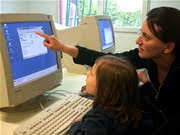
Do we live in era of change or in a changing era?
First some theory and history...
"Information society", "information age", "knowledge society", "post-industrial society" and "global village" are just a few of the terms that have been used in an attempt to identify and understand the extent of these changes. However the selected term in itself does not define content. Content emerges from usage within a specific social context. It is therefore expected that any term used to designate the society in which we live, is backed by the varied opposing projects of society.
Ok, the "child" has many names. So why have we ended up using the "information society"? In 1973, sociologist Daniel Bell introduced the notion "information society" in his book "The Coming of Post-Industrial Society". He believes that this society will mainly consist of theoretical knowledge and warns that knowledge-based services will be transformed into the central structure of the new economy and of an information-led society, where ideologies will end up being superfluosus. The expression reappears strongly in the 90s during the development of the World Wide Web and ICTs. And in 1995, it was included in the agenda of the G7 (now G8) meetings. Since then it has been addressed in forums of the European Community and the OECD, and been adopted by the US government and the UN.
Within this context, the concept "information society" as a political and ideological construct had developed under the direction of neo-liberal globalization, whose main goal has been to accelerate the establishment of an open and "self-regulated" world market.
Well, it didn't actually go as planned. The idea was, as I understand, to close the gap between the rich and the poor in the world. But the opposite happened. Increased pressure was placed on the developing countries at the end of last century by devolped countries who now already had adopted ICT infrastructure polices. Instead of trying to adapt themselves, developing countries had to leave the way free for investments by telecommunications and informatics companies, in search of new markets to maintain growth of earnings.
This is one of the reasons why I think that our "information society" does not benefit everbody (for now). On the other hand you could say that "a fight" always has a loser, but in this case I think that if we are going to include everybody in this society, we have to STOP, evaluate and perhaps take one step back. We have to give those who need it, the chance, the time and the economy to adopt to this society themselves. In my opinion this is one of the main tasks in trying to close the big (and growing) gap between the rich and the poor in this world!
The following video shows some interesting facts and how we can use ICT to help balance the inequity in developing countries around the world.
I think we have to bring this with us to the classroom and to our children as well. Don't misunderstand me, the inclusion of ICT in today's education is crucial after my opinion, but sometimes I think we have to stop and slow things a bit down.
It's important that our children understands that it's not about what ICT can do for them, but what they can do for themselves with the help from ICT.
Hi Magne :-)
SvarSlettYour reflection touches a very important and serious problem of digital divide and social polarity within the information technology revolution. In your final conclusion you draw attention to the fact that technology itself is neutral. It's always people who make it ether "good" or "bad". It's not technology that misuse people but people who misuse technology. Our Information Age is very challenging. Our times are probably most complex ever and very changeable in it's complexity. I like the motto for your post very much. I think we live in both, in an era of change and a changing era.
BG:-)